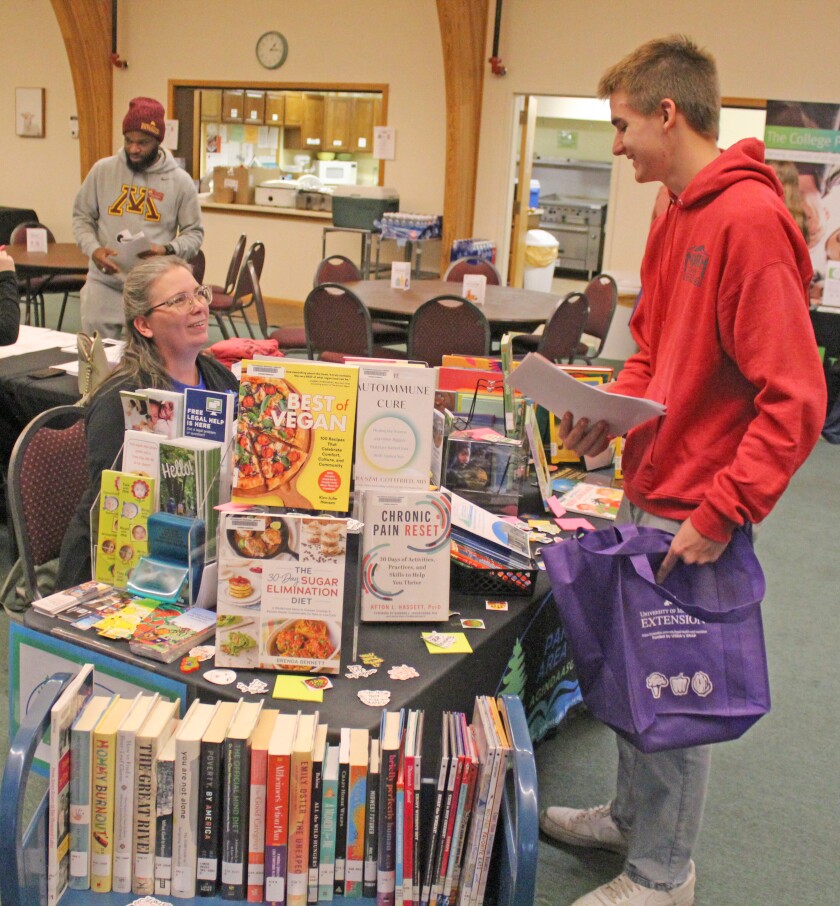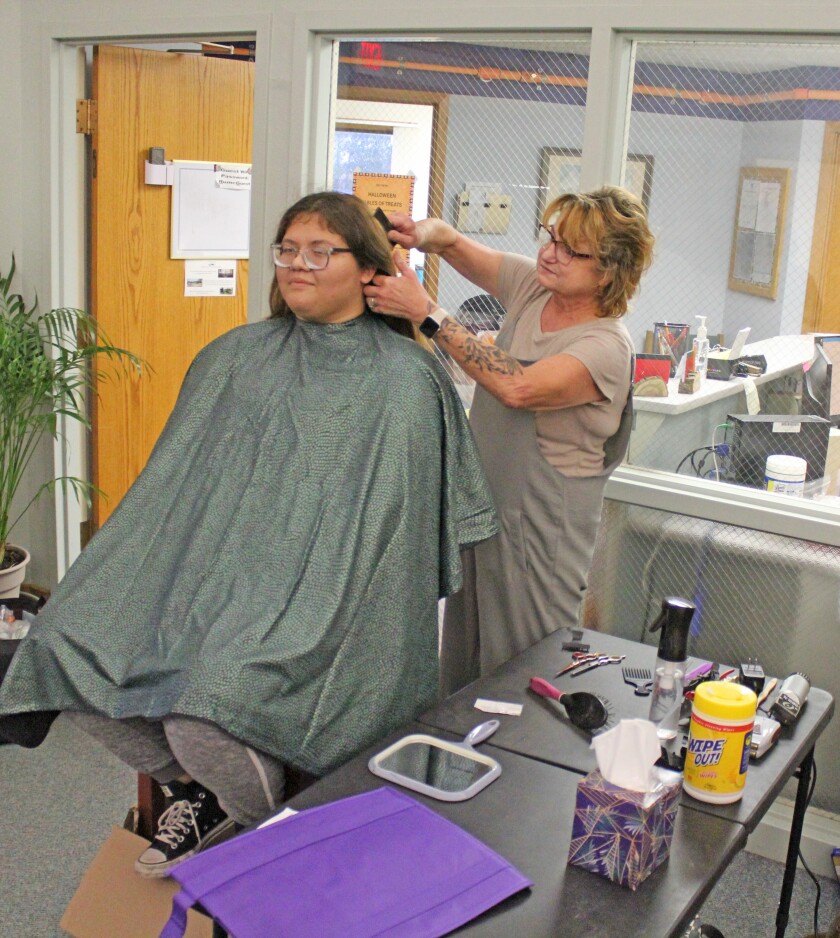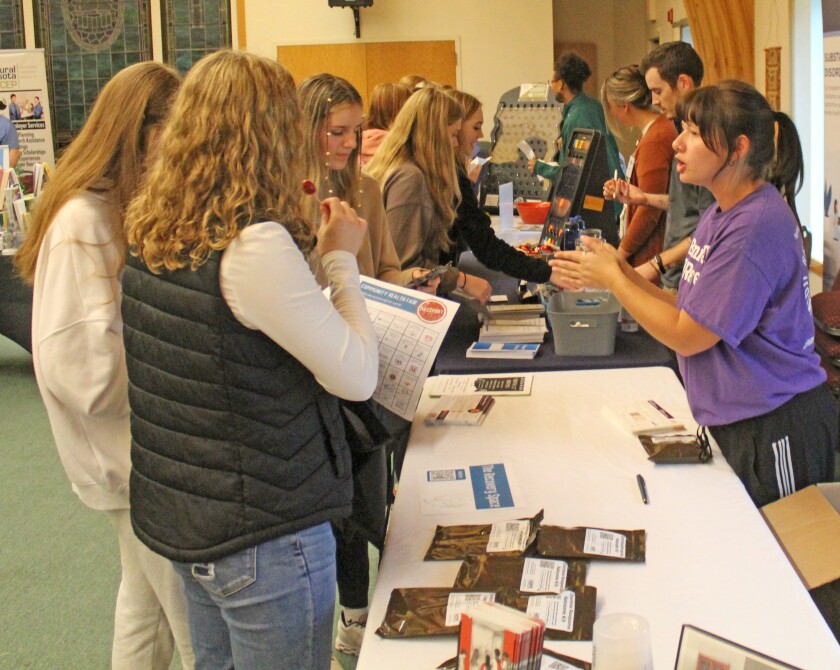The University of Minnesota Hubbard County Extension’s free community health fair brought in a big crowd Tuesday at Riverside United Methodist Church in Park Rapids.
Among the first to arrive were students from Nevis High School and the Park Rapids Alternative Learning Center. However, the event was open to the public.
They were greeted by informative booths, games, munchies, gifts and materials from the Extension, the Hue-Man Partnership, Youth Emergency Shelter & Supports (YESS), the Recovery Space, Sanford Health Behavioral Health, the Bemidji State University social work program, Greater Minnesota Community Services, the Family Advocacy Center of Northern Minnesota, MAHUBE-OTWA, Wellness in the Woods, Rural Minnesota Concentrated Employment Program (CEP), the Education Credit Management Corp., the Park Rapids Area Library, Lutheran Social Service of Minnesota, Homebase Housing Services, Living at Home, League of Women Voters and multiple tables promoting suicide prevention.
Attendees had opportunities to be screened for diabetes and heart disease. A cosmetologist gave haircuts; there was face painting; and pianist Debbie Center performed live music.
Speakers included Tim Denney on suicide prevention, Joe Johnson on recovery from drug and alcohol addiction, Stephanie Lynn on brest cancer and Scott Freitag on prostate cancer and schizophrenia.
Donna Anderson with the Extension said she, Johnson, Kori Nelson with YESS, put the event together to enable different agencies to share information and help make people healthier.

Robin Fish / Enterprise
Representing Parenting Solutions, formerly the FATHER Project, Johnson said he used to work with fathers in the community but now serves entire families.
Asked about his message for high school students attending the health fair, Johnson said, “Even if they’re not a parent, they can come and be involved. Not only can they have a safe and secure place to come together, but also, learning skills for when they become parents down the road is also very healthy and unheard-of. So, we’re doing those things now.”

Robin Fish / Enterprise
Library assistant Leann Willenbring represented the Park Rapids Area Library with a table full of books in multiple formats, ranging from children’s picture books to Spanish and dual language materials and adult nonfiction on health concerns and cooking.
April Miller represented Headwaters Alliance for Suicide Prevention (HASP). “We’re here to offer different supports for people who have experienced suicide loss or suicidality themselves,” she said. “I personally host a support group in the Bemidji and Cass Lake areas, to provide what supports I can to our community.”
Miller’s materials included coloring sheets, including a floral design with the text “It’s OK not to be OK”; a cartoon depicting brains labeled with different feelings and the caption, “You spend most of your life inside your head. Make it a nice place to be”; and the words “Stay – Tomorrow Needs You” in the shape of a heart.
Brody Wright with the Extension was handing out resistance bands and sharing information about muscle strengthening exercises.
“We want to show people how to exercise at home without actually paying for a gym membership,” he said. “A lot of people can’t afford a gym membership.”
Creative approaches included lifting soup cans, but Wright said he prefers a resistance band because you can adjust how you hold it based on how much effort you want to put in.

Robin Fish / Enterprise
Ginnie Petersen, a board member and treasurer with YESS, said the organization was trying to build awareness of what it is and what it can do in the community for teenagers.
“It’s been super successful,” she said.
Clarence Jones with Hue-Man Partnership called it a coalition of collaborators working on public health issues that the community identifies as important. He said they collect local narratives and look for research data that they can bring back to the community for discussion.

Robin Fish / Enterprise
“A lot of times in our communities, people complain about this or that, or they’re saying they have these concerns, but they don’t have data,” he said. “And government likes data.”
On display at Hue-Man’s table were books they’ve participated in, including “The Daddy Book,” a “Men’s Good Health Journal,” “Nurturing Young Minds,” “Linking Fathers: Father Involvement in Early Childhood Programs.”
A doula who specializes in working with dads, Jones said his organization wants to provide opportunities for people to have healthier families.

Robin Fish / Enterprise
Licensed, on-call drug counselor Isabella Schaefer with the Recovery Space in Bemidji displayed packets of intramuscular naloxone response kits. “It’s the generic version of nasal Narcan,” she said. “What this is used for is to reverse overdoses.”
Meanwhile, Angela Graham with Hubbard in Prevention presided over a nearby table with a pile of similar-looking kits. In her case, they were Deterra bags – “an environmentally safer way to dispose of over-the-counter or prescribed medications,” she said. “We don’t want anybody to just throw them away in their garbage or flush them down the toilet, because that has environmental factors that are harmful.”
She explained how it works: You add your unused medication to the pouch, add some water, and it deactivates the drug, making it safe to throw away. The idea, she said, is to get the drugs out of the home, where they could be a health risk.
“You never know who may come into your home that may be looking for something,” she said.



